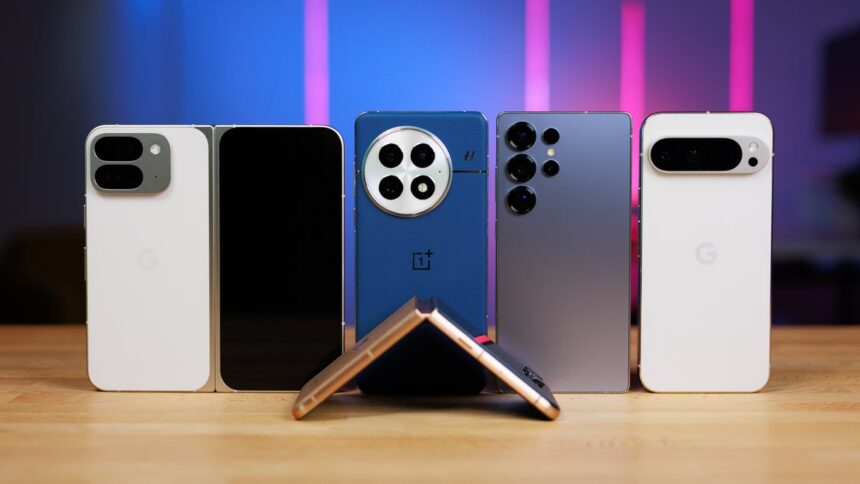Buying a new smartphone in 2025 is no longer a simple errand for most Nigerians. With the naira fluctuating, tech prices climbing, and hundreds of sleek models flooding markets from Ikeja’s Computer Village to online platforms like Jumia and Konga, shoppers face a maze of choices.
This phone buying guide unpacks the crucial steps, shaped by Nigeria’s economic reality and global tech trends, to help you make a smart, lasting investment.
Set Your Budget and Match It to Your Lifestyle
A solid starting point in any phone buying guide is understanding how much you can comfortably spend. The National Bureau of Statistics reports that the naira lost nearly 30 percent of its value in 2024, pushing many flagship phones above N1 million.
Casual Users: If you mainly browse social media, chat, and stream, reliable mid-range Android devices priced around N250,000 to N450,000 can deliver long battery life, solid cameras, and decent speed without overextending your wallet.
Power Users & Gamers: Those running heavy apps, editing videos, or gaming at high refresh rates should budget N600,000 or more to secure top-tier processors, 12GB RAM, and advanced cooling systems for smooth performance.
Content Creators: For professional photographers or vloggers, expect to invest upwards of N800,000 for flagship devices offering pro-level camera sensors, large storage capacities, and multi-lens versatility.
This section of the phone buying guide is critical because setting a budget early helps avoid “promo panic” during flash sales or when tempted by monthly installment offers from carriers.
Decide Between Android and iOS Ecosystems
Another pillar of the phone buying guide is selecting an operating system that matches your digital lifestyle. Nigeria remains an Android-heavy nation, with over 82% market share (StatCounter 2025) thanks to its flexibility, wide hardware range, and lower entry price.
Customization is a big plus: you can tweak home screens, install third-party launchers, and even sideload apps not on Google Play.
Apple’s iOS, however, attracts those seeking a premium, seamless experience. Integration with MacBooks, iPads, and Apple Watches, plus industry-leading privacy, justifies its higher cost for many professionals and creatives.
However remember, shifting between these ecosystems can be tricky, switching from Android to iOS may mean repurchasing apps, losing certain WhatsApp backups, or adjusting to Apple’s stricter app environment.
Choosing your OS carefully ensures your new device remains compatible with your workflow and social circle for years to come.
Focus on Hardware That Delivers Real Value
Hardware remains the heart of this phone buying guide, and in Nigeria’s climate, where heat and power interruptions are common, practical specs matter more than marketing buzzwords.
Processor & RAM: Target latest-gen chips like Snapdragon 8 Gen 4, Apple A18 Bionic, or MediaTek Dimensity 9400. Pair them with at least 8GB RAM to keep multitasking smooth even with demanding apps.
Display: Opt for OLED or AMOLED panels with 120 Hz refresh rates, which stay vivid under Lagos’s midday sun and make scrolling silky smooth.
Storage: Minimum 128GB is non-negotiable. For 4K video creators or gamers, 256GB or expandable microSD storage is safer.
Battery & Charging: With unpredictable PHCN supply, a 5,000 mAh battery and 65W or faster charging are vital. Many 2025 models now charge from 0–80% in under 30 minutes, ensuring you can power up quickly between outages.
Camera System: Don’t chase megapixels alone—look for large sensors, optical image stabilization, and AI-powered enhancements. Premium 2025 phones often score 150+ on DxOMark, rivaling entry-level DSLRs.
These detailed hardware targets in the phone buying guide help Nigerian buyers identify phones that perform reliably in both urban and rural settings.
Prioritize Connectivity and Software Support
Connectivity is another make-or-break area highlighted in this phone buying guide. Nigeria’s major cities, Lagos, Abuja, Port Harcourt, are steadily expanding 5G coverage, making 5G support essential for future-proof internet speeds.
Wi-Fi 6 and 6E (and emerging Wi-Fi 7) deliver faster, more stable connections for households where mobile data often becomes the backup during power outages.
Software updates are equally critical. With cybercrime on the rise, timely security patches protect sensitive data on banking and fintech apps like Opay and Flutterwave.
Top brands such as Apple, Google, and Samsung now commit to five to seven years of OS and security updates, ensuring your device stays safe and current long after purchase.
Build Quality, Security, and Local Extras
Finally, the phone buying guide stresses durability and security, especially in Nigeria’s bustling urban environment.
Durability: Look for phones with IP68 water/dust resistance and Gorilla Glass Victus 2 to survive drops, sudden downpours, and everyday bumps.
Security: Hardware-level encryption plus biometric authentication, face unlock or ultrasonic fingerprint scanners, guard personal data, vital for Nigerians who conduct mobile banking and crypto trading.
Extras: Features like wireless charging, eSIM support, and reverse charging add flexibility for frequent travellers or entrepreneurs who rely on their devices as business hubs.
These extras can be the difference between a phone that merely impresses today and one that remains a dependable companion for years.
Buy for Tomorrow, Not Just Today
In Nigeria’s fast-changing economy, a smartphone is more than a gadget, it is a mobile office, camera, entertainment center, and banking platform.
This 2025 phone buying guide shows that the best device isn’t necessarily the flashiest or most expensive; it’s the one that balances performance, durability, and value for the long haul.
By considering budget, operating system, hardware, connectivity, and build quality, Nigerian buyers can avoid costly mistakes and secure a phone that will stay powerful and relevant through future software updates, shifting market prices, and the country’s unique power and connectivity challenges.
Frequently Asked Questions (FAQs) About Phone Buying Guide
What is the most important factor to consider when buying a phone in 2025?
The key factor is how well the phone fits your budget and usage needs. Evaluate what you’ll use it for, social media, gaming, content creation, or business, and choose specs like processor speed, RAM (at least 8 GB), and storage (128 GB or more) accordingly.
Should I choose Android or iOS?
It depends on your ecosystem and preferences. Android offers a wider price range and customization, while iOS provides tighter security and seamless integration with other Apple devices. The right choice comes down to your app habits, existing devices, and how much you value flexibility versus simplicity.
How much RAM and storage do I really need?
For most users, 8 GB of RAM is the sweet spot for smooth multitasking, and 128 GB storage is the minimum for apps, photos, and videos. Gamers or content creators should aim for 12 GB RAM and at least 256 GB storage to handle 4K videos and large apps.
Why are battery capacity and fast charging so critical in Nigeria?
With unpredictable power supply, a 5,000 mAh battery and fast charging (65 W or more) ensure the phone can last all day and recharge quickly during short electricity windows. These features prevent frequent low-battery stress and are strongly recommended in every Nigerian phone buying guide.
How important are software updates and 5G support?
Very important. Long-term software and security updates (five years or more) protect against cyber threats, while 5G support future-proofs your device for faster internet as Nigeria’s 5G networks expand. Both features help your phone stay relevant and secure for years.





